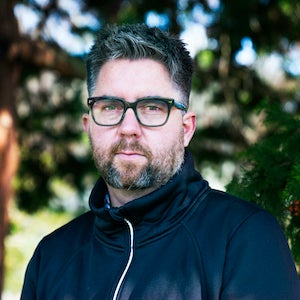Although not a new addition to URI, Associate Professor Kyle Kusz is discovering a new identity within URI’s College of Arts and Sciences (A&S). He first came to URI in 2003 as member of the kinesiology department, which suited his undergraduate, masters, and doctorate degrees in kinesiology. He spent close to fifteen years in kinesiology before moving to his current position serving jointly in the Departments of English and Gender and Women’s Studies (GWS). “While a lot of my research focuses on sports media,” he explains, “I’m excited to feel free to not have to focus only on things related to sports.” As such, Kusz says he’s found that his position in the liberal arts has offered a freedom and community to support his true passion of studying the deep meanings people give to sports. He is a firm believer in the power of storytelling and how storytelling in sports can be misused to “mask privilege and inequalities,” noting that his current work explores “how social power operates through sporting cultures.” He continues, “It can be studied in this literary way, this critical cultural way, so we can see how power operates in everyday life and how people pushback against power.”
Kusz says he has found particular enjoyment in teaching courses on film genre, a pop culture course designed to unpack discourse and language, and a sports media course of his own design titled ENG 210: Reading Sports, Seeing Life. Kusz saw ENG 210 as an opportunity to blur the lines that divide sports culture and “lessons about structural inequalities and resisting power structures in sports.” He is an avid advocate for uncovering the interrelatedness of STEM and the liberal arts in sociopolitical contexts. Kusz says he trusts that “if more people pursued a liberal arts education, then the way by which we value people based on material things would be different.” Kusz also expresses admiration for his new colleagues in the Department of English, noting that “their education around literature and learning about culture and power through storytelling provides such knowledge and wisdom that is useful for navigating this time that we’re living in.”
Kusz structures his pedagogy around a discussion-based approach in which open dialogues and student examples drive what each group discusses and learns. He says his classes are best “when I have open dialogues with students, they and I get the most out of it.” He continues, “I’m always amazed with how I feel like I can say something in class and I can have a vocal student reiterate exactly what I just said, but when they say it, it actually means more to their peers.” Kusz also emphasizes the significance of keeping his work as a researcher and a professional grounded in accessibility for any curious learner. “I’m a first-generation college student and I think every time that I write something, ideally I want to write it in a way my parents can understand,” he says. Lastly, he brings an honest voice to the classroom as he adds, “For me, I teach these topics, whether it’s bringing up some of my personal experiences with performing masculinity in the GWS classes I teach or even the extent to which I talk about race and racisms with students, I always try to talk about how I experience these things in my everyday life because otherwise I wouldn’t have credibility, and I often talk a lot about the mistakes I make along the way.”
~Written by Sabrinna Forgarty

